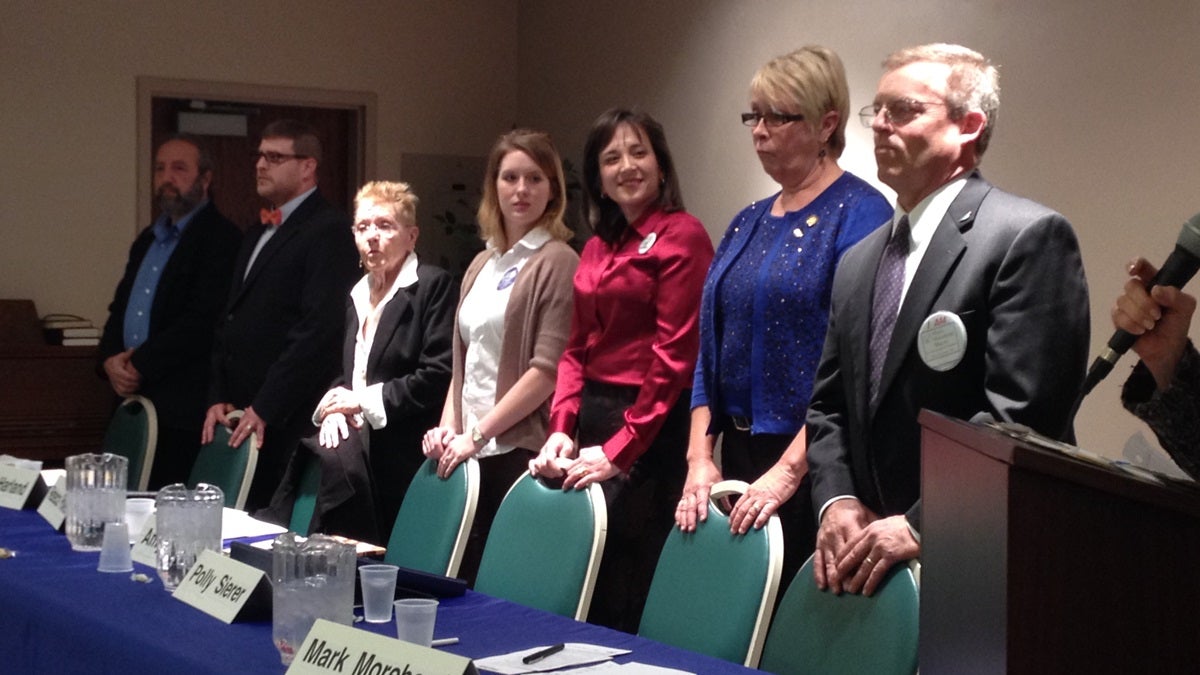Newark mayoral candidates take center stage

(Shana O'Malley/WHYY)
Hundreds of Newark residents gathered at the city’s senior center Thursday night for a mayoral candidate forum hosted by the New Castle County League of Women’s Voters.
Seven candidates have thrown their hats into the race to fill the seat vacated by Mayor Vance Funk who retired earlier this year after a nearly a decade on the job. Deputy Mayor Jerry Clifton is filling in until the special election later this month.
Candidates include Newark City Councilman Mark Morehead, Amy Roe, Don DelCollo, Robyn Harland, Rebecca Powers, Polly Sierer and Matthew Vento.
The group answered nearly a dozen questions from the audience such as how they would react to the proposed data center at the University of Delaware’s STAR campus, how they plan to manage the city’s budget and how the candidates plan to increase transparency in city government.
Data Center Debate
The data center, a $1 billion, 248-Megawatt natural gas power plant, has been a hot button topic among residents.
Those who support the center say it will put Newark in the center of cutting edge technology while bringing back some jobs that the city lost when the Chrysler plant shut down.
Opponents don’t want the facility so close to residential neighborhoods because of pollution and noise.
Mayoral candidates Sierer, Roe, Vento and Harland said there hasn’t been enough information given about the facility and would like to see more facts and more community input.
“We need to improve our communication with those who can impact change. Not just for this project, but for the future development of the STAR campus. As mayor I would seek to create a steering committee that has representatives from the university, the city, businesses and the community among others to keep an open dialogue about potential development and tenants at STAR campus,” said Sierer.
Candidate Vento noted that other colleges such as the University of Minnesota, Harvard and Cornell all have successful power plants, but not nearly as large as the one proposed for UD.
“We need to ask, what are you planning to do and why,” said Vento of the data center.
Roe, a member of the Delaware Sierra Club, has been vocal about her concerns over the lack of transparency within city government regarding the plant and other issues.
“My position on the data center is an iconographic of some of the larger issues we’re having in our city that we really need to correct to protect our quality of life,” she said.
Harland said she was on hand for the very first unveiling of UD’s plans for the former Chrysler plant, now called the STAR campus.
“The presentation that was made at that time, by the university about what they were going to do with the old Chrysler plant, is not quite what is there now,” she said.
Candidates Powers and DeCollo are against the project.
“My main reason is water,” said DeCollo. “All the residents of Newark, the whole university including 20-plus thousand students and 1,300 commercial customers of this city and thousands of employees use 1.3 billion gallons of water a year. The power plant will employ 72 employees and use over one billion gallons of water a year.”
Powers said the vast power plant doesn’t belong in a residential area.
“I know there are many Newarkers looking for work, looking to support their families and themselves and I think we can find a more appropriate project for the University of Delaware’s STAR campus,” said Powers. “It’s a great asset to our community, but I think we can find a more appropriate project aligned better for the health and safety of our community.”
As a sitting city council member, Morehead was unable to state his position on the plant.
The proposed data center isn’t the only issue Newarkers took up regarding the University of Delaware.
Residents also expressed interest in reinstating a town and gown committee to bring together university and community representatives and would like more enforcement regarding student housing rentals and absent landlords.
Budget and Transparency
As mayor, the elected official will be responsible for overseeing the city’s roughly $40 million budget and residents want to know how the candidates will keep the revenue flowing.
DeCollo noted that $2.3 million of the city’s budget is dependent on parking fines, costing motorists thousands of dollars a day. “We need to come up with new ideas,” he said.
Roughly 60 percent of revenue comes from utility charges and several candidates said they’d like to see the city more diversified.
Roe explained that the university, which owns more than 40 percent of land in the city, is exempt from paying property tax, so the funds have to be made up in another way.
“Our electricity rates are being used as a surrogate for paying property taxes, and we can deduct property taxes from our income taxes but we can’t deduct our electric bills from our income taxes,” said Roe. “The problem is complex.”
Powers said she’d like Newark to be part of the “payment in lieu of taxes,” a federal program that helps offset the local loss in property taxes. She said members of the General Assembly are working to put that on the January agenda.
“Transparency” was a word that all candidates shared throughout the forum and each promised that if elected, they would provide new ways to engage the public, share information and demand accountability in all forms of city government.
Now it’s up to the Newark voters, who will head to the polls on Nov. 26.
WHYY is your source for fact-based, in-depth journalism and information. As a nonprofit organization, we rely on financial support from readers like you. Please give today.




